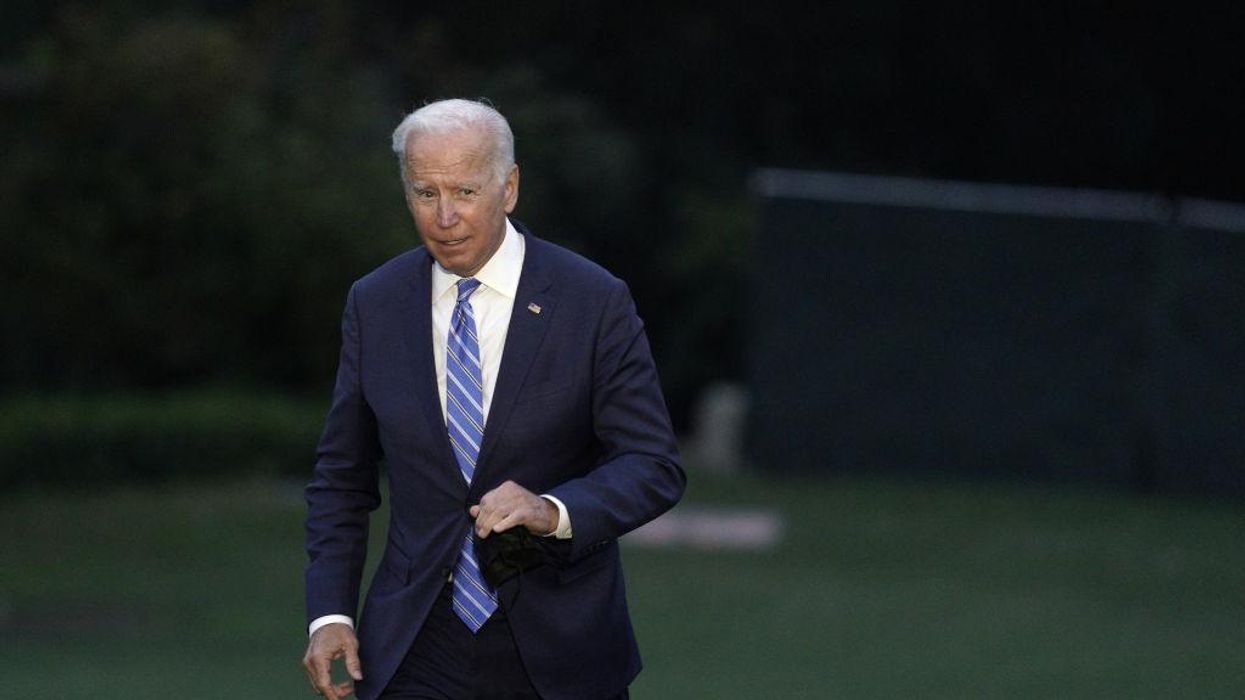
Yuri Gripas/Abaca/Bloomberg via Getty Images

President Joe Biden suggested on Tuesday that Senate Democrats might change the rules to create an exemption to the Senate filibuster that would allow them to raise the debt limit without GOP support and without using budget reconciliation.
Speaking to reporters, Biden said there is a "real possibility" that Democrats would carve out a debt-limit exemption to the Senate filibuster — the rule that creates a 60-vote threshold for passing legislation when a senator objects to passing a bill.
Creating such an exemption would allow Democrats to raise the federal government's $28.4 trillion debt limit without GOP support.
But it's unlikely to happen. Democrats need a majority vote to change the filibuster rules, and at least one Democratic senator is adamantly opposed to considering any change to the filibuster.
That lawmaker, Sen. Joe Manchin (D-W.Va.), said Monday, "The filibuster has nothing to do with debt ceiling. Basically, we have other tools that we can use and if we have to use them we should use them."
Emphasizing his position, he told reporters: "Forget the filibuster, OK? We can prevent default ... there's a way to do that. There's a couple other tools that we have that we can use. Takes a little bit of time. It's going to be a little bit of pain, long vote-a-ramas."
On Oct. 18, government spending will hit the debt limit — a law that sets a cap on the amount of money the government is allowed to borrow to meet its spending obligations. The government has various bills to pay including everything from entitlement programs, funding for law enforcement, the salaries for employees of the vast federal bureaucracy, subsidies for businesses, grant money for research, the interest payment on the national debt, and much, much more. Because Congress almost always runs budget deficits, the United States needs to borrow money to pay all of these bills.
Every few years the amount of spending Congress has approved greatly exceeds the amount of money the government is allowed to borrow, and lawmakers eventually agree to raise the debt limit to borrow more money to pay all its bills. Debt limit increases almost always have bipartisan support.
But this year, with a 50-50 Senate, Republicans are refusing to vote for a debt limit increase in protest of President Biden's demands for a $3.5 trillion bill funding his economic and climate agenda. They have twice now prevented the Senate from raising the debt limit, blocking a short-term government funding bill that would have suspended the debt limit through 2022.
By themselves, Democrats do not have enough votes to meet the 60-vote threshold to pass a debt limit increase, and so Democrats and the media are accusing Republicans of recklessly risking government default — the inability of the government to meet its payments on the debt.
Treasury Secretary Janet Yellen has repeatedly warned that default would have catastrophic economic consequences. On Tuesday, she said failure to raise the debt limit would plunge the United States into a recession.
Republicans insist, however, that Democrats have enough votes to raise the debt limit by including such an increase in the $3.5 trillion spending bill they want to pass through budget reconciliation — a process that allows Democrats to circumvent the filibuster. Using this strategy, Democrats can raise the debt limit without GOP support and without changing the filibuster rules.
Manchin prefers the reconciliation strategy, and ultimately that's the most likely avenue for Democrats to raise the debt limit without Republican support.
But Senate Majority Leader Chuck Schumer (D-N.Y.) has previously ruled out the possibility of using budget reconciliation for the debt limit, saying "going through reconciliation is risky to the country and is a non-starter."
Why might he do this? Adding the debt limit to the budget reconciliation bill would make that bill must-pass, else Democrats would risk government default. It would also give moderate senators like Manchin or Sen. Kyrsten Sinema (D-Ariz.) enormous leverage over what else is included in the bill, because their votes are needed to pass it.
Manchin and Sinema have already made demands to reduce the size of the reconciliation package. With more leverage, they could make further demands to gut priorities the most progressive lawmakers in the party are demanding to keep Biden's campaign promises.
The gridlock has forced congressional Democrats to float several hare-brained schemes to figure out a way to pass the debt limit increase. President Biden's suggestion that they can change the rules of the filibuster is just the latest unrealistic idea in a series of desperate attempts to avoid what Democrats will ultimately have to do: compromise.